
This guide for instructors gives guidance on using AI and ChatGPT in teaching.
- Subject:
- Computer Science
- Information Technology
- Material Type:
- Module
- Teaching/Learning Strategy
- Author:
- University of Arizona Libraries
- Date Added:
- 10/20/2023

This collection includes openly licensed resources about digital citizenship and related topics. Digital citizenship is a broad term that encompasses the idea of becoming a safe, responsible, and ethical user of information in the digital space.
Collection thumbnail for Digital Citizenship is from Unsplash.

This guide for instructors gives guidance on using AI and ChatGPT in teaching.
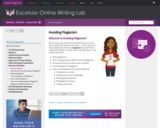
We know you have come to this tutorial because you are a serious writer who wants to write well — and correctly! You have probably heard the word plagiarism and would like to understand it better. You have come to the right place. In this tutorial, you’ll learn:
What plagiarism is
How to recognize seven different kinds of plagiarism
The correct way to use ‘open access’ materials
The consequences of plagiarism
How to avoid plagiarism by doing the following:
Citing sources correctly
Recognizing ‘common knowledge’
Writing good paraphrases
Writing good summaries
Taking careful notes

You can use CC-licensed materials as long as you follow the license conditions. One condition of all CC licenses is attribution: crediting the author and giving the source information. Generally speaking, attribution must reasonably include all relevant information supplied by the licensor. Because each use case is different, you can decide what form of attribution is most suitable for your specific situation. The following examples are intended to illustrate what typical prudent practices look like. We expect community norms and expectations to evolve with time, and will adapt this guide accordingly. In addition to attribution, there are also things to consider as a licensor or a licensee. If you are a licensor and would like to learn how to mark your own material with a CC license, here.

Your town is holding a mayoral election and the stakes have never been higher. You suspect one of the candidates will begin pushing false information to swing the election. As the cybersecurity expert, your job is to inoculate the townspeople against false information. First, you must learn the strategies of disinformation trolls. Claire Wardle explores the tactics of disinformation campaigns

The Stanford History Education Group (SHEG) is a research and development group based in Stanford’s Graduate School of Education. In 2014, we set out to develop short assessments to gauge young people’s ability to evaluate online content. Our work was supported by the Robert R. McCormick Foundation, the William and Flora Hewlett Foundation, the Spencer Foundation, and the Silver Giving Foundation.
Specifically, we sought to measure Civic Online Reasoning — the ability to effectively search for, evaluate, and verify social and political information online. We use this term to highlight the civic aims of this work. The ability to evaluate online content has become a prerequisite for thoughtful democratic participation.

A short course for students to increase their proficiency in analyzing and interpreting data visualizations. By completing this short course students will be able to explain the importance of data literacy, identify data visualization issues in order to improve their own skills in data story-telling. The intended outcome of this course is to help students become more discerning and critical users of data, graphs, charts and infographics.

The goal of this lesson to raise students’ awareness and understanding of what deepfakes are, how they can cause harm, and how they could be regulated. The lesson also encourages students to question their own manipulation of images and video.

This guide provides resources on the topic of Digital Citizenship, as a supplement to the OERTX Digital Information Literacy Hub.

A course about digital citizenship and its importance in using the internet. This quick and easy-to-follow module includes the four key aspects of digital citizenship and videos that contain further information on those key aspects. This resource can be utilized as a learning tool for both teachers and middle school-aged/high school-aged learners who are directly interacting with or new to how the internet works. This resource can also be utilized as a source to learn and practice digital citizenship together in the classroom.

This module aims to equip you with a broad understanding of digital security and ethics and outlines some of the steps you can take to protect yourself and your work.
By the end of this course you will be able to:
Recognise basic terminology relating to digital security
Identify the main types of malware (malicious software), the main malware dissemination methods, and associated protection measures
Explain the security challenges associated with wireless networks and operating online
Demonstrate an understanding of firewalls,password security and other online protection measures
Assess the risks you or your organisation face and implement a risk management plan
Recognise the importance of behaving ethically online
Identify the ethical concerns associated with your work/project

Digital literacy is a ‘life skill’ in which individuals develop skills and abilities, using digital tools appropriately to locate, evaluate, analyze, synthesize and construct new knowledge, communicate and interact with others in a creative and transformative way.
According to the bibliography, DL is a multidimensional literacy that involves a technical/ operational dimension which refers to mechanical and practical skills; a cognitive dimension related to Information literacy skills and content creation skills; and a social-emotional dimension which focuses on an individual’s development to communicate with others and enable social action
A six module course that goes over evaluating online information, working with different digital formats, ethical communication and sharing of information, and understanding online risks and threats.
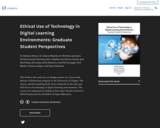
Short Description:
This book is the result of a co-design project in a class in the Masters of Education program at the University of Calgary. The course, and the resulting book, focus primarily on the safe and ethical use of technology in digital learning environments. The course was organized according to four topics based on Farrow’s (2016) Framework for the Ethics of Open Education.This is the first of 2 Versions of this pressbook. Click on Volume 2 for information.
Long Description:
This book is the result of a co-design project in a class in the Masters of Education program at the University of Calgary. The course, and the resulting book, focus primarily on the safe and ethical use of technology in digital learning environments. The course was organized according to four topics based on Farrow’s (2016) Framework for the Ethics of Open Education. Students were asked to review, analyze, and synthesize each topic from three meta-ethical theoretical positions: deontological, consequentialist, and virtue ethical (Farrow, 2016). The chapters in this open educational resource (OER) were co-designed using a participatory pedagogy with the intention to share and mobilize knowledge with a broader audience. The first three chapters in the book discuss specific ethical considerations related to technologies such as Artificial Intelligence (AI) , social networking services (SNS), and 3D printing. The next four chapters shift to a broader discussion of resource sharing, adaptive learning systems, STEM, and assistive technologies. The final two chapters discuss admissions and communications that need to be considered from an institutional perspective. In each of the nine chapters, the authors discuss the connection to the value of technology in education, and practical possibilities of learning technologies for inclusive, participatory, democratic, and pluralistic educational paradigms.
Word Count: 56853
ISBN: 0-88953-438-1
(Note: This resource's metadata has been created automatically by reformatting and/or combining the information that the author initially provided as part of a bulk import process.)

Did your mother call you to tell you about that new miracle cure for Alzheimer's disease? Did your Facebook feed pop up with an article on a factory farm of pigs intended for human transplant harvesting? Did one of your friends breathlessly tell you that there's a new spider that's going to kill us all? You might have heard any or all of these stories, but there's one thread connecting all of them: they're not true.
The ability to tell accurate news from fake news is an important skill that you'll use for the rest of your life. This LibGuide will give you valuable insight in telling fact from fiction online, plus a chance to exercise your newfound skills.

How to protect your personal information and privacy, stay safe online, and help your kids do the same.
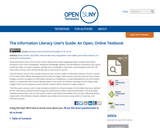
Good researchers have a host of tools at their disposal that make navigating today’s complex information ecosystem much more manageable. Gaining the knowledge, abilities, and self-reflection necessary to be a good researcher helps not only in academic settings, but is invaluable in any career, and throughout one’s life. The Information Literacy User’s Guide will start you on this route to success.The Information Literacy User’s Guide is based on two current models in information literacy: The 2011 version of The Seven Pillars Model, developed by the Society of College, National and University Libraries in the United Kingdom and the conception of information literacy as a metaliteracy, a model developed by one of this book’s authors in conjunction with Thomas Mackey, Dean of the Center for Distance Learning at SUNY Empire State College. These core foundations ensure that the material will be relevant to today’s students.The Information Literacy User’s Guide introduces students to critical concepts of information literacy as defined for the information-infused and technology-rich environment in which they find themselves. This book helps students examine their roles as information creators and sharers and enables them to more effectively deploy related skills. This textbook includes relatable case studies and scenarios, many hands-on exercises, and interactive quizzes.
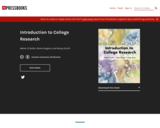
"This book acknowledges our changing information landscape, covering key concepts in information literacy to support a research process with intention. We start by critically examining the online environment many of us already engage with every day, looking at algorithms, the attention economy, information disorder and cynicism, information hygiene, and fact-checking. We then move into an exploration of information source types, meaningful research topics, keyword choices, effective search strategies, library resources, Web search considerations, the ethical use of information, and citation." From the Introduction.
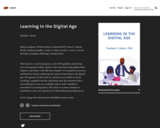
This book is a work in progress; and will hopefully remain that way in perpetuity; where authors will come back and update their chapters and others will add more chapter. It is aimed to serve as a textbook for classes exploring the nature of learning in the digital age. The genesis of this book is a desire to use OERs in all my teachings, coupled with the realization that the resources that I was looking for were not available and as such I needed to contribute in creating them. This book is a minor attempt to contribute to the vast repository of Open Educational Resources.

Taking up the challenge of navigating the complex world of digital humanities, Making Sense of Digital Humanities offers readers an exploration of the many ways scholars have employed the diverse toolkit of digital humanities to create a better understanding of the synergies and disruptions created by technological change.

Media and information literacy curriculum for educators and learners

As more and more classes include online discussion components, it becomes more and more important for instructors to understand the rules of etiquette that, when followed, help make the individual postings easy to follow, keep the conversation thread focused, and the overall discussion on-track.
Unregulated, an online discussion can quickly disintegrate into a tangled web of extraneous verbiage, rude language, and inconsiderate behavior guaranteed to derail the conversation.
The basic premise is that the etiquette expected of your students in online discussions is the same as that which you expect in a classroom. There is a problem, though: the absence of visual and auditory clues. In face-to-face discussions these clues contribute a lot of nonverbal nuances of meaning carrying an intangible amount of weight. It’s impossible to replicate these in an online environment.
To counteract that shift, to raise general awareness, and to assist you in enhancing the learning experience of your students, here are a dozen online discussion rules to include in your syllabus. Notice that most of them are just as applicable in face-to-face discussions.